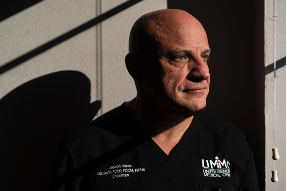Effects of probiotics supplementation on reducing inflammation in burn patients
Evidence based case report
Abstract
Background: Burn injuries cause significant physical trauma and complex inflammatory responses, accounting for more than 300,000 deaths per year. Probiotics may help modulate inflammation in burn patients by improving biomarkers such as hs-CRP and IgA levels. This case report aims to investigate the effect of probiotics supplementation on reducing inflammation in burn patients. Methods & Materials: A literature search was on three large databases: PubMed, Cochrane Library, and Google Scholar. MeSH terms, advanced search, and eligibility criteria were used for title and abstract screening after removing duplicates. Critical assessment tools and levels of evidence of the final articles are based on the Oxford Center for Evidence-Based Medicine. Results: Two randomized controlled trials (RCTs) met the PICO and eligibility criteria. One RCT found that probiotics supplementation significantly reduced hs-CRP levels (21.38 ± 44.45 vs 36.36 ± 79.03; p < 0.001) and improved wound healing in burn patients. The other RCT found that single and mixed strain probiotic administration significantly increased IgA levels (p < 0.001 and p = 0.025, respectively) in burn patients. Conclusions: Probiotics supplementation demonstrates significant benefits in reducing systemic inflammation and enhancing immune function. Further research is necessary to provide recommendations of probiotic use in burn care.Downloads
References
World Health Organization. Burns. WHO. 2023. Diakses pada 3 Juni 2024. Diakses dari: https://www.who.int/en/news-room/fact-sheets/detail/burns.
Wardhana A, Winarno GA. Epidemiology And Mortality Of Burn Injury In Ciptomangunkusumo Hospital, Jakarta: A 5 Year Retrospective Study. Jurnal Plastik Rekonstruksi. 2020 Jan 15;6(1):234–42.
Masoumi S, Mahdavi-Roshan M, Majidiniya A, Ghaffari ME, Pirdastan S, Hajian A, et al. Effect of probiotic administration in inflammatory responses of thermal burns. Eur J Inflamm. 2023;21.
El-Ghazely MH, Mahmoud WH, Atia MA, Eldip EM. Effect of probiotic administration in the therapy of pediatric thermal burn. Annals of Burns and Fire Disasters. 2016;268-73.
Saputro ID, Putra ON, Pebrianton H, Suharjono. Effects of probiotic administration on IgA and IL-6 level in severe burn patients: A randomized trial effects. Annals of Burns and Fire Disasters. 2019;10-21.
Putra O, Pebrianton H, Suharjono S, Iswinarno I, Rahayu D. The Role of Probiotics in Inflammatory Responses of Critically-Ill Burn Patients (A Randomized Clinical Trial). In Atlantis Press; 2017.
Zha X, Su S, Wu D, Zhang P, Wei Y, Fan S, et al. The impact of gut microbiota changes on the intestinal mucus barrier in burned mice: a study using 16S rRNA and metagenomic sequencing. Burns Trauma. 2023;11.
Wang K, Zeng Q, Li KX, Wang Y, Wang L, Sun MW, et al. Efficacy of probiotics or synbiotics for critically ill adult patients: A systematic review and meta-analysis of randomized controlled trials. Vol. 10, Burns and Trauma. Oxford University Press; 2022.
Rousseau AF, Losser MR, Ichai C, Berger MM. ESPEN endorsed recommendations: Nutritional therapy in major burns. Clinical Nutrition. 2013;32:497–502.
Afr S, Clin J, Prins N. Review: Nutritional management of the burn patient. Vol. 22, S Afr J Clin Nutr. 2009.
Ogunbileje JO, Porter C, Herndon DN, Chao T, Abdelrahman DR, Papadimitriou A, et al. Hypermetabolism and hypercatabolism of skeletal muscle accompany mitochondrial stress following severe burn trauma. American Journal of Physiology-Endocrinology and Metabolism. 2011;165–78
Mahmooud WH, Mostafa W, Abdel-Khalek AH. Effect of immune-enhancing diets on the outcomes of patients after major burns. Ann Burns Fire Disasters. 2021;192-6.
Plaza-Diaz J, Ruiz-Ojeda FJ, Gil-Campos M, Gil A. Mechanisms of action of probiotics. Adv Nutr. 2019;10:S49–66.
Azad MA, Sarker M, Li T, Yin J. Probiotic species in the modulation of gut microbiota: an overview. Biomed Res Int. 2018;94:78-90.
Wang Y, Wu Y, Wang Y, Xu H, Mei X, Yu D, et al. Antioxidant properties of probiotic bacteria. Nutrients. 2017;9(5):521.
Kobyliak N, Conte C, Cammarota G, Haley AP, Styriak I, Gaspar L, et al. Probiotics in prevention and treatment of obesity: a critical view. Nutr Metab (Lond). 2016;13:14.
Park JH, Um JY, Hong SH. Mechanism of immunomodulation by probiotics. J Biosci Bioeng. 2015;120(3):247–55.
Ouwehand AC. A review of dose-responses of probiotics in human studies. Benef Microbes. 2017;8(2):143–51.
Submitted
Copyright (c) 2025 Nadhira Nuraini Afifa, Wiji Lestari

This work is licensed under a Creative Commons Attribution 4.0 International License.
World Nutrition Journal provides immediate open access to its content under the Creative Commons Attribution License (CC BY 4.0). This permits unrestricted use, distribution, and reproduction in any medium, provided the original work is properly cited.













